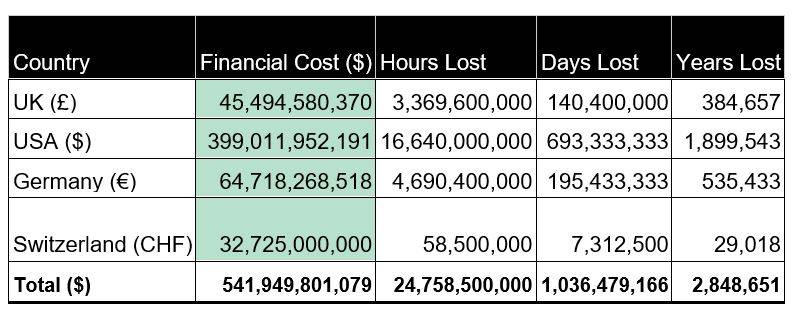January 21, 2019
Pointless meetings set to cost organisations $541bn this year
 Professionals spend two hours a week in pointless meetings, which will add up to over $541bn worth of resource around the world in 2019. That is the main claim in a new report from Doodle. The State of Meetings Report 2019, calls on proprietary data from the firm alongside new research conducted with 6,528 professionals in the UK, Germany and the USA. The report claims to be a comprehensive look at the time taken up by cancelled or unnecessary meetings, inefficient ways of working and preferred methods of meeting and features expert comment from organisational academics and psychologists.
Professionals spend two hours a week in pointless meetings, which will add up to over $541bn worth of resource around the world in 2019. That is the main claim in a new report from Doodle. The State of Meetings Report 2019, calls on proprietary data from the firm alongside new research conducted with 6,528 professionals in the UK, Germany and the USA. The report claims to be a comprehensive look at the time taken up by cancelled or unnecessary meetings, inefficient ways of working and preferred methods of meeting and features expert comment from organisational academics and psychologists.
Key findings include:
- Professionals spend 2 hours a week in pointless meetings, which will add up to over $541bn worth of resource in 2019
- The average professional spends three hours a week in meetings – making two thirds of all meetings unnecessary or a waste of time
- Cumulatively, 24bn hours will be lost to pointless meetings in the next year
- More than a third (37%) of professionals consider unnecessary meetings to be the biggest cost to their organisation
- 76% of professionals prefer face to face meetings to calls or video chats
- Mornings are overwhelmingly the best time to hold a meeting – with 70% of professionals preferring meetings between 8am and 12pm
How poorly organised meetings affect the bottom line
Poorly organised meetings cost companies a huge amount in time and money every year. Professionals in the UK, Germany and USA spend two hours every week in pointless meetings, adding up to 13 days over the course of a year. The average professional has three meetings each week, with an average duration of one hour per meeting. Proportionally – professionals feel that two thirds of the meetings they attend are unnecessary.
The cost of poorly organised meetings is most keenly felt in Switzerland, where 46% of professionals see this as the biggest cost to their organisation, compared to 40% in the UK, 38% in Germany and 34% in the USA. Doodle also calculated the cumulative yearly cost, in time and hours, to companies in the countries surveyed:
Delving deeper into the specific personal impact, over a quarter (26%) stated that poorly organised meetings impacted their client relationships, while others feel they create confusion in the workplace (43%), and impact their ability to actually do their work (44%).
Supporting this is the finding that a third (33%) of professionals find themselves unable to contribute to most of the meetings they attend – suggesting over-invitation is a major waste of time at work.
Doodle analysed over 19 million meeting requests and responses to determine the average length of time it takes someone to respond to a meeting invite, identifying the most and least efficient countries at scheduling meetings:
- Most efficient:
- Italy – 5 hours 24 minutes
- Poland – 5 hours 30 minutes
- Israel – 5 hours 48 minutes
- Least efficient:
- Sweden – 10 hours 18 minutes
- Switzerland – 10 hours 30 minutes
- France – 10 hours 45 minutes
Face to Face is best
Despite technology giving us the ability to join meetings anywhere in the world, face to face meetings are still clearly our preferred meeting method.
76% of professionals surveyed named this as their favoured format, with other methods scoring low:
- Conference calls – 7%
- Video calls – 5%
- Instant-messaging – 4%
When asked about the benefits of face to face meetings, respondents were clear about definite benefits of meeting in person:
- 95% of professionals also feel that meeting in person was an effective way of building relationships at work
- less than half (47%) said the same about instant messaging
What makes a good, or bad meeting?
Respondents were also quizzed about what makes a good, or bad meeting, with the results showing that clear organisation is essential for a good meeting, while distracting or inefficient behaviour derails meetings:
What makes for a good meeting?
- Setting clear objectives – 72%
- Setting a clear agenda – 67%
- Not having too many people in the room – 35%
What makes a bad meeting?
- People taking phone calls or texting during meetings – 55%
- Participants interrupting each other – 50%
- People not listening to the contributions of others – 49%
- People arriving late or leaving early – 49%
- People talking about nothing for long periods of time – 46%














